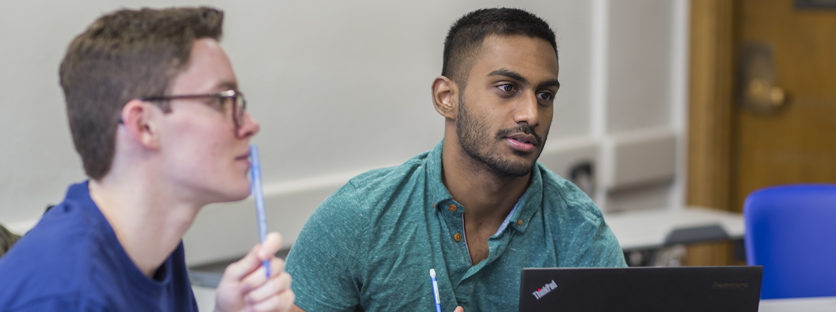
Academic Support and Learning Advancement
Weinberg College and the Searle Center join forces to create ASLA — a resource for academic success at Northwestern
By Daniel P. Smith
The Weinberg College of Arts and Sciences and the Searle Center for Advancing Learning and Teaching have teamed together to establish a new, centralized unit at Northwestern for academic support.
Launched in January in partnership with the University Libraries, the Academic Support and Learning Advancement unit (ASLA) offers all Northwestern undergraduates an easily located, central place to obtain academic help outside of the classroom. With the motto “Success is not a solo endeavor,” ASLA director Marina Micari says the unit will foster an ecosystem of academic guidance at Northwestern.
“We want to provide support for all students and access to the support they need to navigate academic life, because none of our students should have to trudge through courses alone,” Micari says, adding that ASLA’s location at 2 North in the University’s main library is particularly well suited for study and collaboration. ASLA is also ideally located together with other academic services such as the Writing Place and the Library’s User Experience unit.
Bringing ASLA to life
ASLA was first conceived in 2016, when the Searle Center and Weinberg College delivered a joint proposal to University leadership, citing the presence of centralized support units at peer institutions. The team then joined with the University Libraries to conceive of a student-centered space that might bring together multiple academic services.
The plan called for combining Searle’s longstanding academic support initiatives, peer-tutor training and program evaluation capabilities with Weinberg College tutoring to create a more formalized academic support program.
With the creation of ASLA, Weinberg College and the Searle Center can now more readily promote learning and academic success for a diverse population of students through evidence-based programs and services.
“This signifies to all students that receiving academic help is a normal part of academic life at Northwestern and provides students more seamless access to academic support,” Micari says.
ASLA at work
ASLA’s hallmark offerings include course-linked support to some 30 STEM courses as well as those focusing on economics and statistics. The resources include peer-guided study groups and drop-in peer tutoring, as well as strategic academic support. Through small-group mentoring, peer academic coaching, workshops and one-on-one consultations, for instance, students can learn best practices for studying, time management and exam preparation.
“In the group settings, in particular, students will see others facing similar challenges and can gain different takes on problem solving,” Micari says, adding that the peer-to-peer support, delivered by some 160 peer leaders, is central to ASLA’s positioning. “We hear regularly that students feel more comfortable working alongside their peers who have been in a course previously and are much closer to their level of development.”
ASLA will also offer leadership training for peer tutors, group facilitators and academic coaches as well as an online portal for academic support and enrichment. There are also plans to host research talks, workshops and forums for students as well as faculty and staff, built around topics such as improving study skills and adjusting to academic life at Northwestern.
“The whole point is to help students reach their academic potential,” Micari says, noting that an ASLA advisory board comprised of students, faculty, advisors and staff from a range of University departments will help the new unit make informed programming decisions.
“The first step is to make ASLA a more visible piece of the fabric at Northwestern, but we will continuously work to address gaps in order to drive the academic success of our undergraduates.”
Back to top